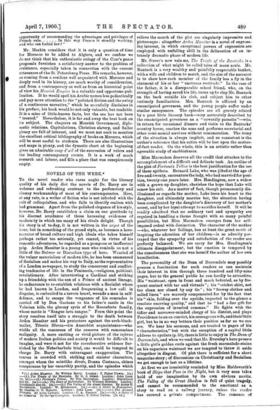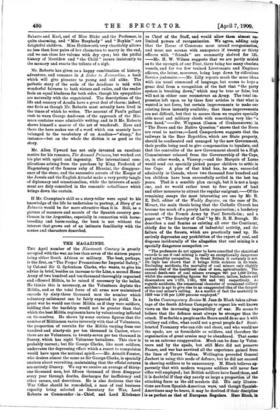NOVELS OF THE WEEK.- To the novel reader who cares
aught for the literary quality of his daily diet the novels of Dr. Barry are in welcome and refreshing contrast to the perfunctory and clumsy workmanship of most of his contemporaries. Here, at any rate, is a writer of fiction who is not infected with the cult of colloquialism, and who fails to identify realism with bad grammar. Apart from the polished elegance of his style, however, Dr. Barry establishes a claim on our gratitude by his discreet avoidance of those harassing evidences of modernity in which too many of his rivals delight. Though his story is of to-day, it is not written in the argot of the hour, bat in something of the grand style, as becomes a hero- narrator of broad culture and high ideals who takes himself perhaps rather too seriously, yet cannot, in virtue of his romantic adventures, be regarded as a pompous or ineffectual prig. Arden Massiter is a young man who reminds us not a little of the Bnlwer or Disraelian type of hero. Wearied of the vulgar materialism of modern life, he has been enamoured of Socialism and makes his way to Italy, as the representative of a London newspaper, to study the concurrent and conflict- ing tendencies of life in the Peninsula,—religions, political, revolutionary. After interviewing a Cardinal and striking up a friendship with the son of a Prince of ancient lineage, he endeavours to re-establish relations with a Socialist whom he had known in London, and frequenting a low cafe in disguise, is embroiled in a tavern brawl, wounds a man in self- defence, and to escape the vengeance of his comrades is carried off by Don Gaetano to his father's castle in the Volscian hills, the gloomy eyrie of the Roccaforte family, whose motto is " Sangue lava sangue." From this point the story resolves itself into a struggle to the death between Arden Massiter and his protectors against the arch-black- mailer, Tiberio Sforza—his Anarchist acquaintance—who wields all the resources of the camorra with remorseless malignity. A more exciting or vivid picture of the inferno of modern Italian politics and society it would be difficult to imagine, and were it not for the corroborative evidence fur- nished by the Notarbarbolo trial, one would be tempted to charge Dr. Barry with extravagant exaggeration. The canvas is crowded with striking and sinister characters, amongst whom the saintlike devote, Donna Costanza, shines conspicuous by her unearthly purity, and the episodes which
• (L) Arden Massiter. By William Barry. London : T. Fisher Unwin. [Cs.] —(2.) The Trials of the Bantoeks. By G. S. Street. London: John Lane. [38. 6d.]—(3.) Fortune's Yellow. By Ella Ifiwmahon. London : Hutchinson and Co. [ss.]—(4.) The Dean of Darrendale. By Winston Eversley. London : Hutchinson and_Co. [6s.]-115.) The Valley of the Great Shadow. By Annie E. Hoidsworth. London : W. elnemann. [6s.]—(6.) A Sister to Evangeline. By Charles 0 D. Roberts. London : John Lane. (6s.]—(7.) The Accusal Prrne...43. Br Allen. upward. London : C. A. Pearson. [6s.]—(8.) A Story of an Es4zneia By George Crampton. London: T. Fisher Unwin. [Ss. 61.]
relieve the march of the plot are singularly impressive and picturesque altogether Arden Massiter is a novel of engross- ing interest, in which exceptional powers of expression are employed with unfailing skill in the delineation of an in• tensely dramatic phase of modern life.
Mr. Street's new volu me, The Trials of the Bantocks, is a collection of what might be called tales of mean souls. Mr. Bantock is a very wealthy and- painfully respectable banker, with a wife and children to match, and the aim of the narrator is to show how each member of the family has a fly in the ointment of his or her " unctuous rectitude." In the case of the father, it is a disreputable school friend, who, on the strength of having saved his life, turns up to clap Mr. Bantock on the back outside his club, and subject him to other untimely familiarities. Mrs. Bantock is afflicted by an emancipated governess, and the young people suffer under similar annoyances. The episodes are all gravely related by a poor little literary hack—very accurately described by the emancipated governess as a " cowardly parasite "—who, in return for occasional dinners and visits to the Bantocks' country house, coaches the sons and performs secretarial and other semi-menial services without remuneration. The irony of the situation is always implicit, and so consistent is the author's reticence that his satire will be lost upon the matter- of-fact reader. On the whole, this is an artistic rather than agreeable study of snobbishness.
Miss Mac mahon deserves all the credit that attaches to the accomplishment of a difficult and delicate task. An outline of the plot of Fortune's Yellow is the best justification for the use of these epithets. Bernard Lake, who was jilted at the age of five-and-twenty, encounters the lady, who had married for posi- tion, twenty-one years later. Mrs. Headington, now a widow with a grown-up daughter, cherishes the hope that Lake will renew his suit. As a matter of fact, though permanently dis- illusioned as regards the mother, Lake loses his heart to the daughter, and ultimately marries her, the situation having been complicated by the daughter's discovery of her mother's secret, and by her loyal attempt to sacrifice herself. It will be readily admitted that no ordinary tact and sympathy are required in handling a theme fraught with so many painful possibilities, but Miss Macmahon emerges from her self- imposed ordeal with distinction. The character of the mother —who, whatever her failings, has at least the great merit of inspiring the adoration of her children—is so adroitly por- trayed that the sympathy and satisfaction of the reader are perfectly balanced. We are sorry for Mrs. Headington's ultimate disappointment, but the emotion is tempered by the consciousness that she was herself the author of her own humiliation.
The personality of the Dean of Darrendale may possibly possess a fascination for such readers as can maintain their interest in him through three hundred and fifty-nine pages, but to the general public he can hardly be attractive. His "waistcoat, open in front and much befouled, as by fre- quent contact with tar and victuals"; his "cricket shirt, not too clean nor closed by any tie " ; his " frowsy clothes and soiled linen" are scarcely compensated for by the fact that his " skin, folding over the eyelids, imparted to the glance a resolute unerring quality," and that he " had a fine gift for the expression of inverted commas." He fights with the tidier and narrower-minded clergy of his district, and plays Providence to an ex-convict, his courageous wife, and their little girl, but he in no way betters their position as far as we can see. We bear his sermons, and are treated to pages of his "characteristics," but with the exception of a capital little address to cyclists (p. 59), there is little to enjoy in The Dean of Darrenclale, and when we read that Mr. Everaley's hero presses a little girl's golden curls against the fresh marmalade-stains on his capacious waistcoat we are tempted to throw it aside altogether in disgust. Of plot there is sufficient for a short magazine story ; of discussions on Christianity and Socialism we get enough to last us a lifetime.
At first we are irresistibly reminded by Miss Holdsworth's book of Ships that Pass in the Night, but it very soon takes hold of our imagination by its own obvious merits. The Valley of the Great Shadow is full of quiet tragedy, and cannot be recommended to the emotional as a story to read on a railway journey, nnless the reader has secured a private compartment. The romance of
Babette and Karl, and of Miss Blake and the Professor, is quite charming, and " Miss Busybody " and " Boykin" are delightful children. Miss Holdsworth very charitably allows no less than four pairs of her characters to marry in the end, and we can close her volume with dry eyes; but the pitiful history of Merridew and "the Child" recurs insistently to the memory and exacts the tribute of a sigh.
Mr. Roberts has given us a happy combination of history, adventure, and romance in A Sister to Evangeline, a book which will give pleasure to young and old alike. The pathetic story of the exile of the Acadians is told with wonderful fairness to both victors and exiles, and the reader feels an equal kindness for both sides, though his sympathies are naturally with the expatriated. The descriptions of the life and scenery of Acadia have a great deal of charm; indeed, one feels as though Mr. Roberts must actually have lived in the times of which he writes. The account of Paul's gallant rush to warn George Anderson of the approach of the Mic- mace contains some admirable writing, and in it Mr. Roberts shows himself a master of the art of woodcraft. Here and there the hero makes use of a word which can scarcely have belonged to the vocabulary of an Acadian—" slump," for instance—but on the whole the diction is as good as the story.
Mr. Allen Upward has not only invented an excellent motive for his romance, The Accused Princess, but worked out his plot with spirit and ingenuity. The international com- plications arising from the purchase by King Frederick of Hagensborg of the famous ruby of Bhurani, the disappear- ance of the stone, and the successive arrests of the Keeper of the Jewels and the English Attaché make a very pretty tangle of diplomacy and sensationalism, while the interests of senti- ment are duly consulted in the romantic metsalliance which brings down the curtain.
If Mr. Crampton's skill as a story-teller were equal to his knowledge of the life he undertakes to portray, A Story of an Estancia would be far more attractive than it is. Still, as a picture of manners and morale of the Spanish country gen- tlemen in the Argentine, especially in connection with horse- breeding and horse-racing, the book is not without the interest that grows out of an intimate familiarity with the scenes and characters described.







































 Previous page
Previous page